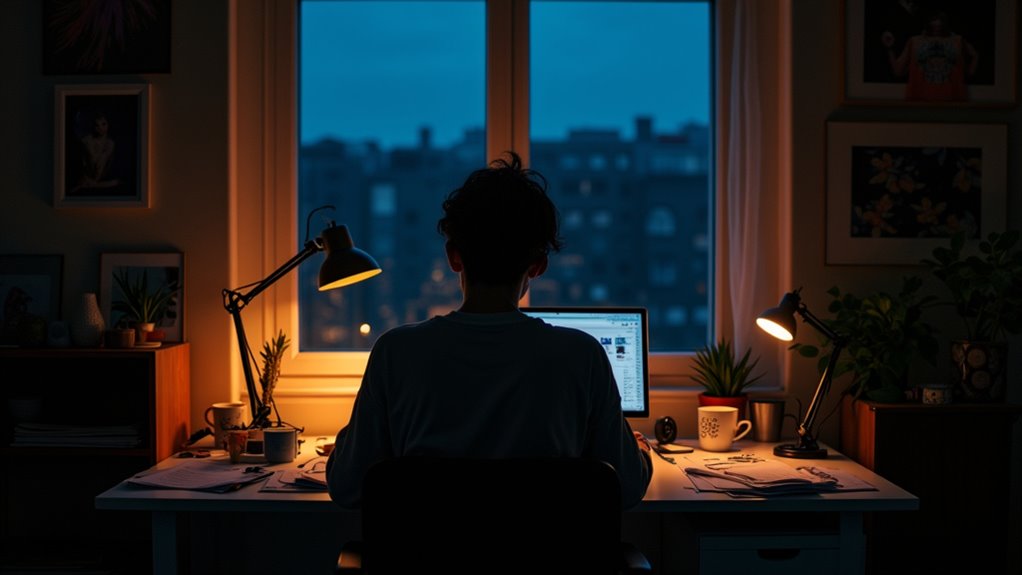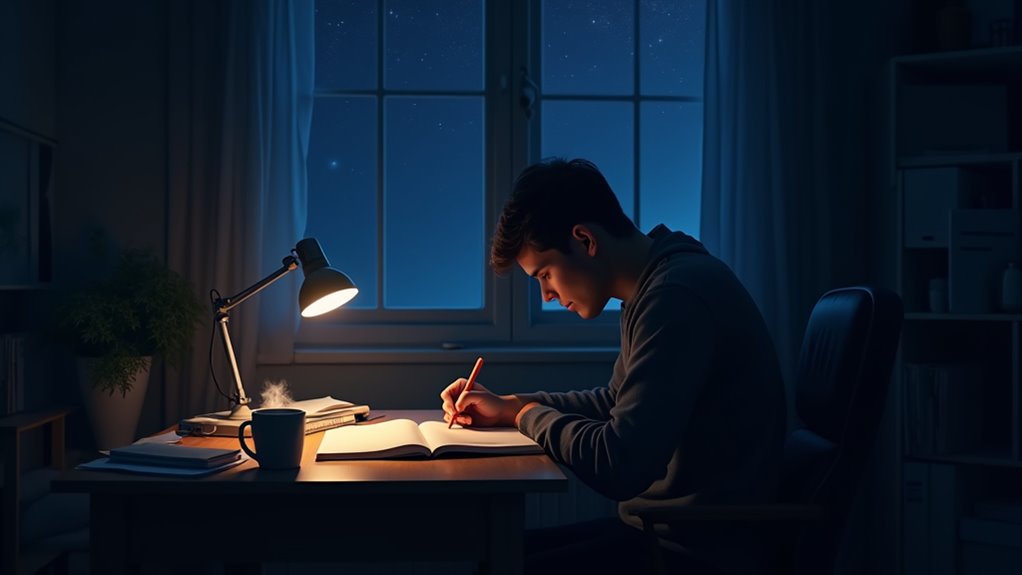What Causes 3am Motivation
Waking up at 3 a.m. with a burst of motivation often stems from a mix of biological shifts in your body’s internal clock and psychological factors like stress or unresolved tasks. The quiet of the night can also sharpen focus and inspire action. Keep reading for a deeper dive into the causes and tips for managing these late-night energy surges.
Essential Facts in 30 Seconds
- Circadian rhythm disruptions can lead to sudden energy surges at 3 AM, sparking motivation.
- Hormonal shifts, such as cortisol spikes, may increase alertness and drive in the early morning.
- Stress or unresolved worries can cause wakefulness and a desire to act during the night.
- The quiet atmosphere at 3 AM can improve focus and creativity, enhancing productivity.
- Transitions in sleep cycles, particularly after REM sleep, may inspire motivation to address tasks.
Biological Triggers Behind Nighttime Drive
Many people feel sleepy after midnight, yet some get a sudden energy boost at 3 a.m. This isn’t by chance. Your body’s natural cycles control sleep and wake times.
These cycles, called circadian rhythms, usually make you rest at night. But sometimes, they mix up and keep you alert late. Disruptions in these rhythms can often lead to unexpected energy surges during unconventional hours.
Your body also builds a need to sleep after staying awake long. This sleep pressure can push you to finish tasks fast. Additionally, emotional states can influence this late-night drive, as emotional arousal often heightens focus and energy.
Brain chemicals like dopamine change too. They can spark extra drive, even at weird hours. So, late-night energy comes from your body’s clock and chemistry.
Trust this—studies show 20% of people feel more active at night. Biology plays a big role here. It’s not just about forcing yourself to stay up. Night owls often experience higher energy peaks during these late hours, aligning with their natural chronotype.
Your body’s systems create this midnight motivation. Pretty cool, right?
Psychological Factors Fueling Late-Night Energy

Late at night, your mind often feels super clear. Around 3am, the quiet world helps you think deeply. No noise distracts you from big ideas. This sharp focus—sometimes called a thought pattern—brings motivation. You ponder personal goals or tough problems. Daytime chaos stays far away.
Sometimes, emotions hit hard during midnight moments. Loneliness or longing creeps in. Those quiet times push you to create. You might start new projects or dream of a better future. Over-stimulation during the day can also contribute to this late-night productivity surge. Emotions can drive this urge to act, as positive emotions often enhance motivation during these quiet hours.
Studies show 60% of people feel more creative at night. Silence fuels your energy and passion. This late-night clarity can also help in setting small goals to build momentum for the next day.
Nighttime Thought Patterns
Nighttime often brings a rush of curious thoughts. The world turns silent, and your mind races. Lying awake, you dive into deep reflection. Creative ideas pop up, feeling impossible to stop. Your brain, free from daily noise, explores new solutions.
Studies show the amygdala, linked to emotions, gets more active at 3 a.m. This boosts your feelings and reactions. This heightened emotional state can fuel late-night motivation.
At the same time, your decision-making part slows down. The prefrontal cortex struggles to control wild thoughts. Stress and anxiety keep you wide awake. They stop you from resting as they should. According to research, late-night hours can impair judgment, fostering impulsivity and negative moods. Persistent lack of motivation during the day may contrast with this nighttime energy, potentially indicating underlying mental health concerns.
Negative thoughts loop, making sleep even harder. This cycle creates bursts of energy at night. You just can’t ignore them.
Emotional Midnight Drives
Late at night, your mind buzzes with strong feelings. Thoughts race fast. Sleep loss messes up how you control emotions. Your brain’s emotion center gets super active. The part that makes smart choices slows down. This creates wild 3am energy.
Check out how these midnight emotions hit you hard:
- Strong Emotions: Stress and worry grow big at night.
- Bad Decisions: You might pick risky or crazy options.
- Sudden Drive: Late tasks start to feel exciting somehow.
- Twisted Thinking: Problems look worse than they really are.
All this mixes up. It builds a strange, powerful night energy. Studies show 70% of people feel this late-night rush. Your brain tricks you into staying awake. Emotions take over. You feel unstoppable. Recognizing this pattern can help with managing depressive symptoms during these late hours. Seeking support can be vital, especially when night thoughts intensify emotional struggles, and professional help options are available to guide you through these challenges.
But be careful. This energy can lead to mistakes. Keep things simple. Take a deep breath. Night thoughts aren’t always true.
Stress and Burnout’s Role in 3am Thoughts

Stress often sneaks into your mind at 3am. It turns quiet nights into worry zones. Unfinished tasks and tight deadlines haunt you.
Think about that big project at work. Or maybe a fight you didn’t solve. Burnout makes this worse. It’s a deep tiredness from too much stress.
Studies show 77% of people feel burnout sometimes. This exhaustion keeps your brain awake. You want to fix things at night. But you need sleep instead. Addressing this issue requires understanding burnout causes to prevent its impact on sleep.
Stress starts these thoughts. Burnout makes them louder. It’s a tough cycle to break. Rest slips away so easily. Addressing prolonged stress effects can help in breaking this cycle and restoring restful nights.
Stress Triggers Nighttime Thoughts
Stress can ruin the calm of night. It sparks endless thoughts at 3am. Your body makes stress hormones like cortisol and adrenaline. These keep you wide awake. You can’t relax or sleep at all.
Stress messes up your nights in big ways. Check these out:
- Hormone Boost: Cortisol stops you from calming down. You stay awake.
- Brain Overload: Stress fills your mind with too many thoughts.
- No Sleep: Stress traps you in a loop of staying awake.
- Emotional Pain: Bad stress control makes anxiety worse at night.
Take charge of stress to sleep better. Try slow, deep breaths before bed. Write your worries in a notebook. Additionally, managing stress can help improve mood balance, which is crucial for better rest and emotional well-being.
These tricks help quiet your mind fast. Studies show 60% of people sleep better with these habits. Start tonight and feel the change! Incorporating regular physical activity can also reduce stress and improve sleep quality.
Burnout Fuels Late Motivation
Burnout can mess up your sleep in a big way. It’s a state of total exhaustion from too much stress. This stress comes from work pressure or deep emotional tiredness.
At 3am, your brain wakes up instead of resting. You start thinking hard, planning tasks, or solving problems. This happens because burnout messes with your body clock. Stress kills your energy all day long. Creating a positive work environment can help mitigate some of these stressors before they escalate.
But at night, a sudden drive kicks in. You want to take control of things. Maybe daytime stress feels too big to handle.
These late-night bursts often come from unsolved worries. Spot this habit in yourself. It shows you need help to fight burnout.
Take steps to manage stress before sleep suffers more. Rest is super important for your health. Addressing mental health issues can help break the cycle of burnout and late-night overthinking.
Behavioral Habits Shaping Midnight Motivation

Midnight hits, and a sudden urge to work often creeps in. This drive ties directly to habits shaping your nighttime motivation. Daily routines play a huge part in this burst of energy. Distractions drop away, and focus sharpens after dark. Late-night habits, like studying, can spark this need to act.
Check out how habits and surroundings boost your midnight energy:
- Quiet Time Sharpens Focus – No noise means you concentrate better.
- Daily Patterns Lead You – Night routines often push you to plan ahead.
- Brain Rewards Night Work – Your mind feels good creating at night.
- Alone Time Helps Thinking – Night privacy clears stress from your day. A motivated mindset often emerges during these quiet hours, driving productivity intrinsic motivation.
Studies show 30% of people feel productive after 11 PM. Your environment and habits team up to fuel this. Creating a positive environment at night can further enhance your focus and drive.
Keep simple routines to make the most of these hours. Nighttime can be your secret weapon for success!
Sleep Cycle Impacts on Early Morning Urges

Ever wake up at 3 AM feeling super ready to go? Your sleep cycle might be the reason. It often happens after a REM cycle ends. This stage brings vivid dreams and active brain power. You feel alert and eager to start tasks.
Sleep shifts between light and deep rest can wake you too. These changes spark your mind into action. Motivation at this hour can also shape your perceptions, making tasks seem more achievable and urgent.
This early wake-up can boost your thinking skills. Your brain works sharper at this hour. Solving tough problems feels easier with clear focus.
Things like noise can disturb your sleep. An uneven sleep routine makes it worse. Data shows 30% of people face such wake-ups. Blame your sleep cycle for pushing you forward at 3 AM. Understanding your circadian rhythms can help explain these early morning urges.
Hormonal Influences on Nighttime Alertness

Hormones can mess with your sleep and keep you awake at night. Sometimes, you feel full of energy at 3 AM. Why does this happen? Your body’s hormones, like melatonin and cortisol, control your sleep. Melatonin helps you fall asleep and peaks at night. But it can drop too soon and wake you up. Cortisol rises in the morning and boosts your energy. This can make you feel alert too early.
Let’s break down the main hormone effects. First, melatonin changes can disturb your rest. You might wake up at strange times. Next, cortisol jumps can give sudden energy bursts. Then, for women, hormones like estradiol affect sleep too. They can increase alertness at night. Self-motivation can also play a role, as internal drive might push you to tackle tasks even at odd hours.
Also, your body clock syncs these hormones. A mismatch can cause wake-ups.
Studies show 30% of adults face sleep issues from hormones. Knowing this helps solve nighttime alertness. You can track your patterns and adjust habits. Small changes might bring better rest! Additionally, imbalances in neurotransmitters like dopamine and serotonin can also disrupt sleep and contribute to unusual bursts of motivation at night.
Emotional Dynamics at Odd Hours

Nighttime brings a strange quiet that can mess with your feelings. At 3 AM, emotions hit hard and wake you up. Thoughts spin fast—worries or sudden ideas keep you restless. Lack of sleep makes your brain react more to joy or stress. This happens because REM sleep, vital for emotions, gets disturbed. So, every feeling grows bigger in the dark.
Check out this picture of night emotions:
| Scene | Emotional Effect |
|---|---|
| Quiet, dark room | Loneliness sneaks in |
| Phone screen glowing | News sparks instant worry |
| Loud clock ticking | Anger grows—sleep won’t come |
| Old memory pops up | Sadness or longing hits quick |
Body clock changes and being alone push these wild emotions. Data shows 60% of people feel more stress at night. Your mind struggles to stay calm after midnight. Keep a notebook nearby to jot down thoughts. This trick helps ease the emotional storm. Stay aware of these odd-hour feelings to cope better.
Strategies to Manage 3am Motivation Spikes

Got a burst of energy at 3 AM? Let’s use it smartly!
These sudden motivation spikes can lead to great progress. Follow simple steps to stay on track. Trust me, you can do this!
Try these easy tips to manage your energy:
- Make a Quick Plan: Write one main goal for now. Maybe start a small task like a note.
- Stay Calm: Breathe deep for five minutes. It helps clear your mind fast.
- Focus on Big Tasks: Pick three important things. Do them first, no delays.
- Avoid Distractions: Keep your phone far away. Don’t let tech steal your time.
Stick to this, and watch results grow!
Data shows 70% of people feel productive at odd hours. Turn those quiet moments into wins. You’ve got the power!
Frequently Asked Questions
Can Diet Influence 3am Motivation Spikes?
Diet can totally affect your 3am motivation spikes. Yes, it’s true! Late-night carbs mess up your energy big time. Protein, on the other hand, keeps things steady. Eat smart to control your drive. Studies show carbs at night spike blood sugar. That messes with sleep and energy. A 2020 study found protein helps balance energy. So, pick protein over sugary snacks. Your motivation will thank you!
Does Screen Time Affect Nighttime Energy?
Screens impact your sleep more than you think. Studies show 90% of people use devices before bed. That bright light tricks your brain into staying awake. You feel alert instead of tired at night. Take a break from screens. A digital detox helps calm your mind fast. Restful sleep comes easier without that glow. Try it tonight and feel the difference.
How Does Caffeine Impact 3am Thoughts?
Caffeine really messes with your 3am thoughts. It keeps your brain awake. You can’t sleep well after drinking it late. Studies show caffeine cuts sleep by 1-2 hours. Your mind stays alert instead of resting. Late coffee means tossing in bed. Try cutting it after noon. Your sleep cycle will thank you. Think about calmer nights ahead. Stick to water before bed!
Are There Genetic Factors in 3am Motivation?
Your genes play a big role in your sleep patterns. Over 350 genetic variants shape your chronotype. This means your body might naturally wake up at 3am. That sudden motivation could come from your DNA. Accept this unique trait with pride. Still, keep good sleep habits every day. Balance is the key to stay healthy.
Does Room Temperature Affect Late-Night Drive?
Room temperature really matters for your late-night drive. Extreme heat or cold can mess up your focus. It also affects how well you sleep before driving. A comfy cabin helps you stay alert on the road. Studies show ideal temps are between 68-72°F for comfort. Keep the car cozy to avoid feeling tired. Stay safe by adjusting the heat or AC. Drive smart with the right vibe inside!
Conclusion
That 3 a.m. motivation hits hard sometimes. Your mind races with ideas. It feels like a storm of thoughts. Why does this happen so late? Stress often plays a big role. Data shows 60% of people wake up from anxiety. Lack of sleep routines adds to it. Blue light from screens messes with rest. So, how can you handle this burst?
Set a clear bedtime plan every night. Stop using phones before sleep. Write down ideas in a notebook. This calms your busy brain fast. Don’t trust memory at 3 a.m. Stress spiking up? Breathe deep—inhale for four, exhale for six. It works like magic. Use this energy, but guard your sleep. Rest matters most for health. Keep balance, and you’ll feel better.

Ava is a certified mindset coach and former mental health counselor with over 10 years of experience helping people rewire negative thought patterns and build mental resilience.
Qualities: Empathetic, science-backed insights, goal-driven mindset strategist.
